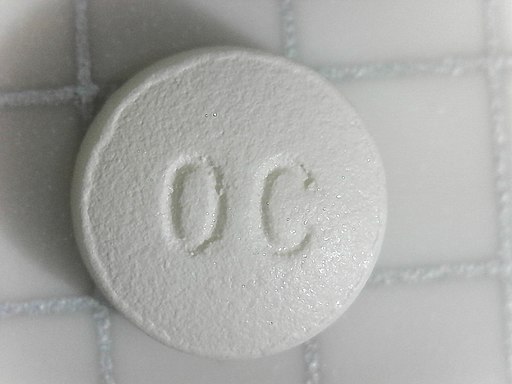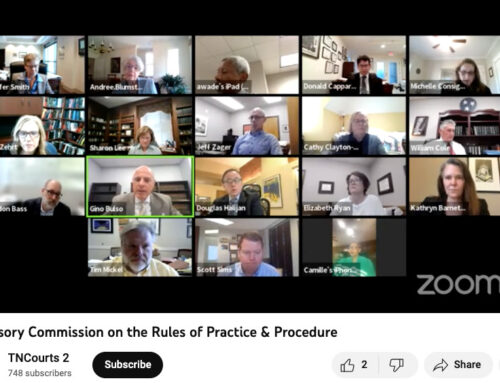
An OxyContin tablet. Purdue Pharma, who makes OxyContin, has asked for a protective order in a Knoxville circuit court to keep concealed some details of allegations by the state of Tennessee that it violated a 2007 court order and the state’s consumer protection laws.
In 2007, the state of Tennessee and 25 other states reached a $19.5 million settlement agreement with OxyContin maker Purdue Pharma, who they alleged was violating consumer laws in the marketing of their cash cow opioid drug.
Among other allegations, the states said Purdue engaged in illegal marketing and downplayed the risks of addiction.
Tennessee’s portion of the settlement was about $720,000. Kentucky decided its $500,000 portion was too small, and pulled out of the settlement to pursue its own litigation in state court against Purdue, where they eventually got a $24 million payout.
At the time of the 2007 settlement, an agreed-upon court order was entered against Purdue in a Tennessee court with 22 compliance provisions and signed by then-Tennessee Attorney General Robert Cooper and Director of the Division of Consumer Affairs Mary Clement.
Just a few of the provisions:
-
- Purdue could not make written or oral claims about OxyContin that were false, misleading or deceptive.
- Purdue could not make misrepresentations with respect to the OxyContin’s potential for abuse addiction or physical dependence.
- Purdue could not tie sales compensation exclusively to volume, along with other restrictions on gifts and payments to doctors and health care professionals.
- Purdue could not provide off-label use information except upon request and had to maintain records of those who asked for such information.
- Purdue could not misrepresent research, as well as research it paid for.
- Purdue had to implement an abuse and diversion detection program.
Fast forward 11 years, past the painful and growing public realization of a national opioid addiction crisis. Tennessee is among the states with the worst problems.
In May, Tennessee AG Herbert Slatery filed a lawsuit in Knox County Circuit Court, alleging that Purdue Pharma had violated the 2007 court order and the state’s consumer protection laws.
The lawsuit was filed under seal. Slatery noted that Purdue believes some of the information in the 270-page complaint would reveal company secrets.
Slatery also argued that the lawsuit’s seal should expire in 10 days because it is a civil enforcement action by the state on behalf of the public and the complaint involves a matter of “immense public concern.”
I agree, and as executive director of TCOG, I and Jack McElroy, editor of the Knoxville News Sentinel, were granted a motion to intervene in the case to oppose any efforts by Purdue to keep the lawsuit and any details in it confidential.
Shortly thereafter, Purdue Pharma filed its motion for a protective order, arguing many items in the state’s lawsuit should not be open to the public because they are “confidential, proprietary and trade secret information.”
In other words, state evidence that details how Purdue allegedly broke the law and violated a court order are things that Purdue thinks should be confidential because — as they say — if known, they would harm the company “by giving its competitors unfettered access” to insider company information.
Knoxville attorney Rick Hollow is representing us in the case. A hearing on the protective order has been scheduled for 9 a.m. Friday, July 6 in Knox County Circuit Court Division 1.
In filing our motion to intervene, we argue “[t]here is a compelling interest by the citizens in the State of Tennessee pertaining to information regarding this issue. Not the least of these concerns is that whatever flows from opioid addiction becomes a matter of critical importance to the fabric of families, cities and counties as well as to taxpayers of the State of Tennessee who will inevitably be asked to, through their tax contributions, to assume the responsibility for the damages and losses suffered by the citizens of this state.”
Our arguments are outlined extensively in our memo filed by Hollow with the motion. When I read it, I made a mental note that we should get it in front of every journalism student in the state. If you need a dose of First Amendment and state law regarding press access to courts, I encourage you to go to our website and print it out.
Our arguments to intervene center around the recognized presumptive rights of access of the public and of the press to trials and judicial records based on common law, the First Amendment, Tennessee’s constitution and state precedent.
We also outline how such rights can only be overcome by a demonstrably stronger competing interest of substantial harm to the entity seeking closure.
Purdue promises to put up a fight. And indeed they have done just that in other states — sometimes successfully.
When Kentucky settled in 2015 for $24 million, the attorney general agreed to seal, return or destroy material received during discovery.
A news organization filed to get documents still in state possession, and a Kentucky circuit judge agreed to unseal them. Purdue appealed, and a ruling by the appellate court is pending.
Here in Tennessee, we should demand nothing less than full transparency to the public in this case.
According to the state, three people in Tennessee now die a day in an opioid-related overdose — more than the number of daily traffic fatalities.
Nothing about what started this epidemic, nothing about any company’s involvement, nothing about the state’s enforcement of our laws and a court order should remain secret if we are to have a chance to mend.
The process of justice must take place in the public. There is no room for secrets anymore.
Deborah Fisher is executive director of Tennessee Coalition for Open Government. She can be reached at [email protected].
Links to court documents:
Tennessee AG Herbert Slatery’s motion and memorandum filing the sealed lawsuit, May 2018
TCOG’s motion to intervene and TCOG’s memorandum supporting the motion May 2018
Purdue Pharma’s motion for a protective order, June 2018
May 2017 settlement between Tennessee and Purdue Pharma and the agreed court order






